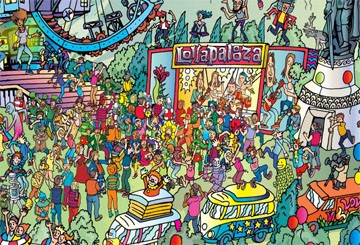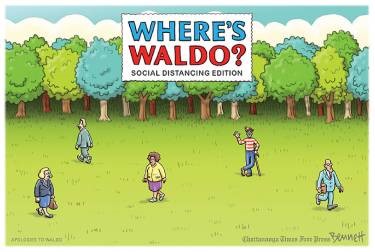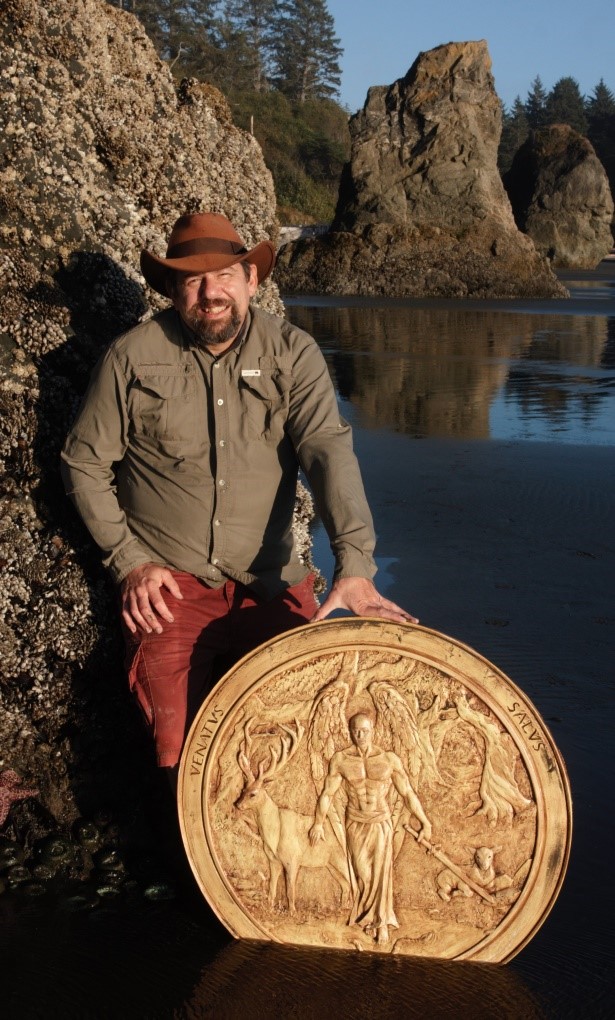By Larry Short
One of the favorite parts of my week is sitting in the hot tub each Sunday night with Jason Comerford. Sometimes we watch wild animals come out of the quiet forest. This week we listened as a nearby fir tree made an enormous “crack” and plunged to the ground with a thunderous crash. In the midst of relative isolation, we enjoy hot water and good fellowship, we pray for each other and our church, and we ask God lots of questions.
And the question that has been most frequently on our minds and hearts in recent months is this: Where is God working in the midst of all this pain and chaos? What is He doing?
I read a blog this week by a pastor and writer I enjoy named John Myer. He asked that exact same question. And he used a set of Where’s Waldo? drawings to provide a possible answer.
First, here’s a Where’s Waldo? drawing from 2019:

How long did you have to look before you found Waldo? I confess I STILL haven’t. (I blame bad eyesight, LOL!)
And now here’s the 2020 social distancing edition:

(Image credit: Times Free Press)
THAT was a lot easier, wasn’t it?
What’s the difference between the two drawings? Obviously the 2019 edition had a lot of noise: visual distractions, lots going on, lots of people. (We might now look back with a sigh—THOSE were the days!)
But in the 2020 edition, those distractions have been mostly removed. We enter a meadow near a forest in a state of solitude. Waldo is much more obvious once the distractions are gone, once the decks are cleared.
Myers made this very uncomfortable observation:
From the spiritual standpoint, God has cleared the decks. There’s very little church stuff left to camouflage Him. The only things left are you, the Bible, and those Christians you meet with. Gone are the pageants, the events, the programs, and every possible fig leaf. (Bareknuckle Bible)
The “fig leaf” part really got to me. Darlene and I had a fig tree once. Fig leaves are scratchy, itchy, awkward, and very uncomfortable. They are of course what Adam and Eve applied as they sought (unsuccessfully) to hide their sin and shame from the God with Whom they had previously fellowshipped in the Garden. (In His mercy and grace, God of course gave them much more comfortable coverings, made of leather—costly as they were in terms of some poor, innocent animal’s blood.)
God calls us to the exact opposite of this scenario: “You will seek me and find me when you seek me with all your heart.“ Jeremiah 29:13
In the Garden, after Adam and Eve sinned, they stopped seeking and started hiding. God in His grace and mercy sought them out instead. And He has done this with each and every one of us. “God demonstrates His own love toward us in this While we were still sinners, Christ died for us” (Romans 5:8). God’s seeking was done on the cross. Christ’s blood became the covering for our sin and shame.
Now that we are forgiven, now that we have no more need of fig leaves, God desires us to seek Him. And He PROMISES us that if we do so with all our heart, we will find Him!
What has this got to do with COVID-19 and social isolation, the risk of possibly debilitating or mortal illness, loss of employment or retirement funds, the departure of many of our sports and entertainment choices, and the sudden evaporation of most if not all our previous trappings of doing church?
You may already see that the answer to this question lies in the two contrasting Where’s Waldo? drawings above. Peel away the distractions, remove the fig leaves, and God is far more easily found.
But, have we been looking? Or do we instead seek to embrace new fig leaves—to create new distractions with which to repopulate the Waldo drawing that is our world?
Are we complaining about our new normal and asking God to restore our previous comforts? Or are we seeking Him with all our hearts TODAY? Now is the time when, perhaps, He will be most easily found. If we would only seek.
Jeremiah challenges me, time and again, when my fig leaves are removed and I feel uncomfortably exposed, to claim God’s promise: “You will seek Me and find Me when you seek Me with all your heart.”
Will you join me in this, as my brother or sister in Christ?
Views – 354
 Follow
Follow